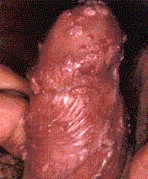  Genital warts, or HPV (Human Papillomavirus), is a highly contagious viral infection of the skin, which causes the growth of tiny red spots that can grow into skin-colored, cauliflower-like masses of various sizes and shapes. These painless growths occur on damp or moist surfaces in both males and females. Other obvious symptoms may not be present, so you may not know you have contracted the virus. Abstinence from sexual intercourse may prevent transmission of this virus from one person to another, as might male or female condoms, but any intimacy (skin to skin contact) with an infected person can spread the disease. 80% of women are exposed to this disease at some point in their life. Infection of a woman's cervix with certain strains of this virus can lead to cervical cancer. Like most viral infections, there is no cure for HPV. Treatment will destroy the infected skin cells, but the disease may come back. If left untreated, genital warts may go away on their own. Treatment can take the form of freezing the growths with liquid nitrogen, destroying the tissue with laser surgery, using a blistering agent such as podophyllin, or burning them off with an acid. Your doctor will recommend the treatment best suited to you. A vaccine against this virus has been approved by Health Canada. Sold by prescription, under the brand name Gardasil, it is designed for females aged nine through twenty-six, and has so far proved to be 100% effective in clinical trials. As a vaccine, it is designed to protect against infection by HPV and the cervical cancer it might cause ... it must be taken before any possible contact with the infection. GONORRHEA | GENITAL WARTS | LICE & CRABS | SCABIES | HEPATITIS | HIV/AIDS |